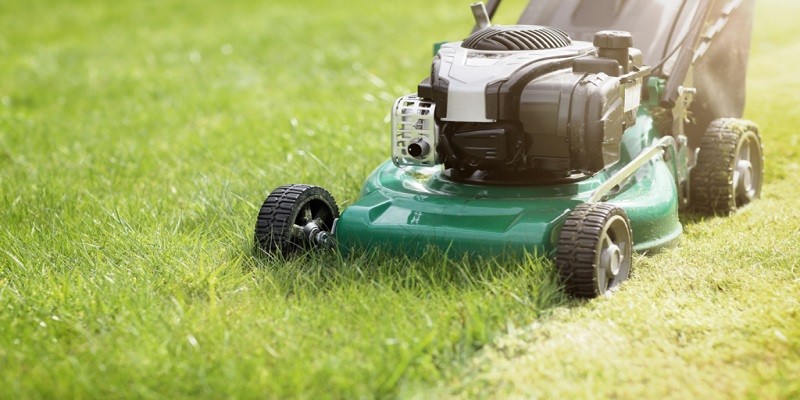Last Updated on January 15, 2025
A lawn mower should never be left in the rain as it can cause damage to the machine. Leaving a lawn mower exposed to rain can lead to rusting, electrical issues, and corrosion of the internal components.
Protecting your lawn mower from the rain is important to ensure its longevity and performance. We will discuss why it is not advisable to leave a lawn mower in the rain and provide tips on how to protect it from the elements.
By following these guidelines, you can safeguard your investment and keep your lawn mower running smoothly for years to come.
Risks Of Leaving A Lawn Mower In The Rain
Leaving a lawn mower in the rain poses risks such as rust, damage to electrical components, and decreased lifespan. It is not recommended to expose a lawn mower to rain as it can lead to expensive repairs or the need for a replacement.
Ensure proper storage to protect your equipment.
We all know that outdoor tools, like lawn mowers, are meant to withstand the elements. However, leaving your lawn mower out in the rain can cause a range of issues that can negatively impact its performance and longevity. In this section, we will discuss the potential risks of leaving a lawn mower in the rain.
Potential Water Damage To The Engine And Electrical Components:
- Water entering the engine can lead to serious damage, as it can mix with fuel and interfere with the combustion process. This can result in difficulty starting the mower or even engine failure.
- Electrical components, such as the ignition system and wiring, are susceptible to water damage. When exposed to rain, these components can short circuit, leading to malfunction or complete failure.
Increased Risk Of Rust And Corrosion:
- Lawn mowers have many metal parts that can rust when exposed to water. Rust weakens the structure of the mower, leading to premature wear and tear.
- The blade, which is crucial for a clean and precise cut, can also rust when exposed to rain. Rusty blades not only affect cutting performance but can also damage the grass by tearing instead of cleanly cutting it.
Negative Effects On The Blade And Cutting Performance:
- When a lawn mower is left in the rain, the blade can become dull more rapidly. This dullness leads to a less effective cutting performance and can result in an uneven, ragged lawn appearance.
- Waterlogged grass can clump together, causing clogs and blockages in the mower’s discharge chute or collection bag. This can further hinder the mower’s cutting efficiency and require frequent maintenance.
It’s important to protect your lawn mower from rain and moisture to ensure its optimal functioning and longevity. Consider storing it in a covered area or utilizing a waterproof cover to shield it from the elements. By taking these precautions, you can avoid the risks associated with leaving your lawn mower exposed to rain.
Precautions To Take When Leaving A Lawn Mower Outdoors
When leaving a lawn mower outdoors, it is important to take certain precautions. However, it is not recommended to leave a lawn mower in the rain as it can lead to damage and affect its performance. It is advisable to store the mower in a covered area or use a waterproof cover to protect it from moisture.
Leaving a lawn mower out in the rain can potentially damage the equipment and affect its performance. To ensure your lawn mower remains in good condition, it is essential to take the necessary precautions when leaving it outdoors. By following these precautions, you can protect your lawn mower from the detrimental effects of rain and moisture.
Store The Mower In A Covered Area Or Use A Waterproof Cover:
- Find a suitable covered area, such as a shed or garage, to store your lawn mower when not in use. This will provide optimal protection against rain and other adverse weather conditions.
- If storing indoors is not an option, use a waterproof cover specifically designed for lawn mowers. This cover will shield your equipment from rain and prevent water from seeping into delicate parts.
Ensure Proper Drainage To Prevent Water Accumulation:
- Position your lawn mower on an elevated surface to ensure water can easily drain away from the equipment. This will prevent water from pooling and causing damage to the mower.
- Regularly clean the undercarriage of your lawn mower to remove debris or grass clippings that might obstruct drainage channels. This will further facilitate proper water flow away from the equipment.
Regularly Inspect And Maintain The Lawn Mower For Any Signs Of Damage:
- Conduct regular visual inspections to check for any signs of damage or wear. Look out for rust, cracks, or any loose parts that could have been affected by exposure to rain.
- Keep the lawn mower blades sharp and free from debris by cleaning them after each use. This will help maintain optimal performance, even when exposed to rain.
By adhering to these precautions, you can mitigate the risks associated with leaving a lawn mower outdoors. Remember, a little extra care goes a long way in preserving your equipment and ensuring its longevity.
Tips For Safely Operating A Lawn Mower In Wet Conditions
Operating a lawn mower in wet conditions requires caution to ensure safety. However, leaving a lawn mower in the rain is not recommended as it can cause damage to its electrical components and overall functionality.
When it comes to mowing the lawn, wet conditions can pose certain challenges. However, with the right precautions and practices, you can safely operate a lawn mower even in rainy weather. Here are some tips to ensure a smooth and accident-free mowing experience:
Adjust The Cutting Height To Prevent Clogging:
- Raise the cutting height of your mower to avoid clogging the deck with wet grass. This will allow better airflow and reduce the risk of clumping.
- Adjust the cutting height based on the condition of your grass and the level of moisture. A slightly higher cutting height is advisable during wet conditions.
Clean And Dry The Mower After Each Use In Wet Conditions:
- After mowing in damp or rainy conditions, make sure to clean your mower thoroughly. Remove any grass clippings or debris to prevent clogging and rusting.
- Dry the mower with a cloth or allow it to air dry before storing it. Moisture trapped in the mower can lead to corrosion and damage over time.
Be Cautious And Aware Of Potential Slipping Hazards:
- Wet grass can be slippery, so it’s crucial to stay vigilant while operating the mower. Watch your footing and be cautious of any potential hazards.
- Avoid mowing on steep slopes or areas with poor drainage, as these can increase the risk of accidents. If necessary, consider postponing mowing until the ground is drier.
By following these tips, you can safely operate a lawn mower in wet conditions. Adjusting the cutting height, cleaning and drying the mower after use, and being cautious of slipping hazards will help you maintain both your safety and the longevity of your equipment.
Remember to prioritize your well-being and take the necessary precautions to mow your lawn effectively, even when it’s raining.

Credit: www.reddit.com
Frequently Asked Questions On Can A Lawn Mower Be Left In The Rain?
What Happens If I Leave My Lawn Mower In The Rain?
Leaving your lawn mower in the rain can cause damage to its electrical components and engine.
Is It Okay For A Lawn Mower To Get Rained On?
Yes, it’s fine for a lawn mower to get rained on.
Can You Leave A Lawn Mower Outside Overnight?
Yes, you can leave a lawn mower outside overnight as long as it is covered and protected from the elements.
Can A Lawn Mower Be Left In The Rain?
Yes, it is not advisable to leave a lawn mower in the rain as it can lead to damage and affect its performance.
How Does Rain Affect A Lawn Mower?
Rain can cause rusting, corrosion, and damage to the electrical components of a lawn mower, leading to decreased efficiency and potential breakdowns.
Conclusion
To maintain the longevity and performance of your lawn mower, it is crucial to protect it from the elements, including rain. Leaving your lawn mower in the rain can lead to rust, corrosion, electrical damage, and overall deterioration. It is important to store your mower in a dry and sheltered area when not in use.
Additionally, it is recommended to cover your mower with a waterproof and breathable cover to provide extra protection. Regular maintenance and cleaning, along with proper storage, will help prolong the lifespan of your lawn mower and ensure it is always ready to tackle your lawn care needs.
Remember, prevention is key, so take the necessary steps to keep your lawn mower safe from the rain and other harsh weather conditions.







